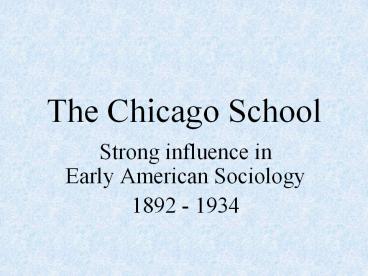The Chicago School - PowerPoint PPT Presentation
1 / 15
Title:
The Chicago School
Description:
of Chicago in 1892. Founded the American Journal. of Sociology in 1895 ... Viewpoint of early sociologists at University of Chicago: concerned about poverty ... – PowerPoint PPT presentation
Number of Views:961
Avg rating:3.0/5.0
Title: The Chicago School
1
The Chicago School
- Strong influence in Early American Sociology
- 1892 - 1934
2
The Chicago School
- Albion Small (1854-1926)
- Established Dept. ofSociology at University of
Chicago in 1892 - Founded the American Journal of Sociology in
1895 - Helped to establish the American Sociological
Society in 1905
3
The Chicago School
- Other famous sociologists at the University of
Chicago - Robert Park
- Ernest W. Burgess
- Louis Wirth
- W. I. Thomas
4
Viewpoint of early sociologists at University of
Chicago
- concerned about poverty and other social
problems - believed that research should be directed toward
social reform - research method emphasized
- Verstehen
- participant observation
5
By the 1930s
- shift away from social reform
- emphasis on scientific objectivity
- movement of the few women in sociology to social
work
6
George Herbert Mead (1863-1931)
- Philosopher who influenced sociologists
- Symbolic Interactionism
- human capacity for thoughtis shaped by social
interaction - people are able to interact because of shared
meanings and symbols - intertwined patterns of interaction are basis
for groups and societies
7
George Herbert Mead (1863-1931)
- Evolutionary and dialectical view of the
social development of the individual - The self evolves by adapting to conditions
within society - Individual development occurs in interaction
with other people
8
George Herbert Mead (1863-1931)
- Development of social self
- the play stage
- (imitating the roles of others)
- the game stage
- (learning connections between roles)
- generalized other
- (internalizing the norms of the group or
community)
9
George Herbert Mead (1863-1931)
- Generalized other
- source of social control
- encourages conformity
- The Me self-control resulting from awareness
of views of others - The I creative part of the self,
- responds to the Me
- may sometimes be non-conformist
10
George Herbert Mead (1863-1931)
- Methodology
- Objectivity is not really possible
- Social scientist is part of the social forces
being studied - Need reflective consciousness
- to note aspects of society that should be
changed
11
Charles Horton Cooley (1864-1929)
- Microsociologist
- Focus on the human mindin the context of society
- Basis for society
- imaginations which people have of one
another
12
Charles Horton Cooley (1864-1929)
- Looking-Glass Self
- The view that we haveof our own selves is based
onhow we imagine that others see us. - That is, interaction with others shapes ones
consciousness, - including the consciousness of oneself.
13
Charles Horton Cooley (1864-1929)
- Different types of interaction
- primary groups
- characterized by loyalty, affection, acceptance,
informal interaction, and a wide range of common
interests - secondary groups
- characterized by a focused purpose, formal
interaction, and a narrow range of common
interests
14
Charles Horton Cooley (1864-1929)
- Methodology
- Statistics are useful
- but need to be combinedwith sympathetic
understandingand imagination - Sociology is not like physics
- it involves interpretation
15
The Women of Hull House
- Led by Jane Addams
- Did statistical research in low-income areas
- Advocated for the poor
- Organized community programs
- Fought for progressive legislation,including an
end to child labor - Shared ideas and methodology with men at
University of Chicago

